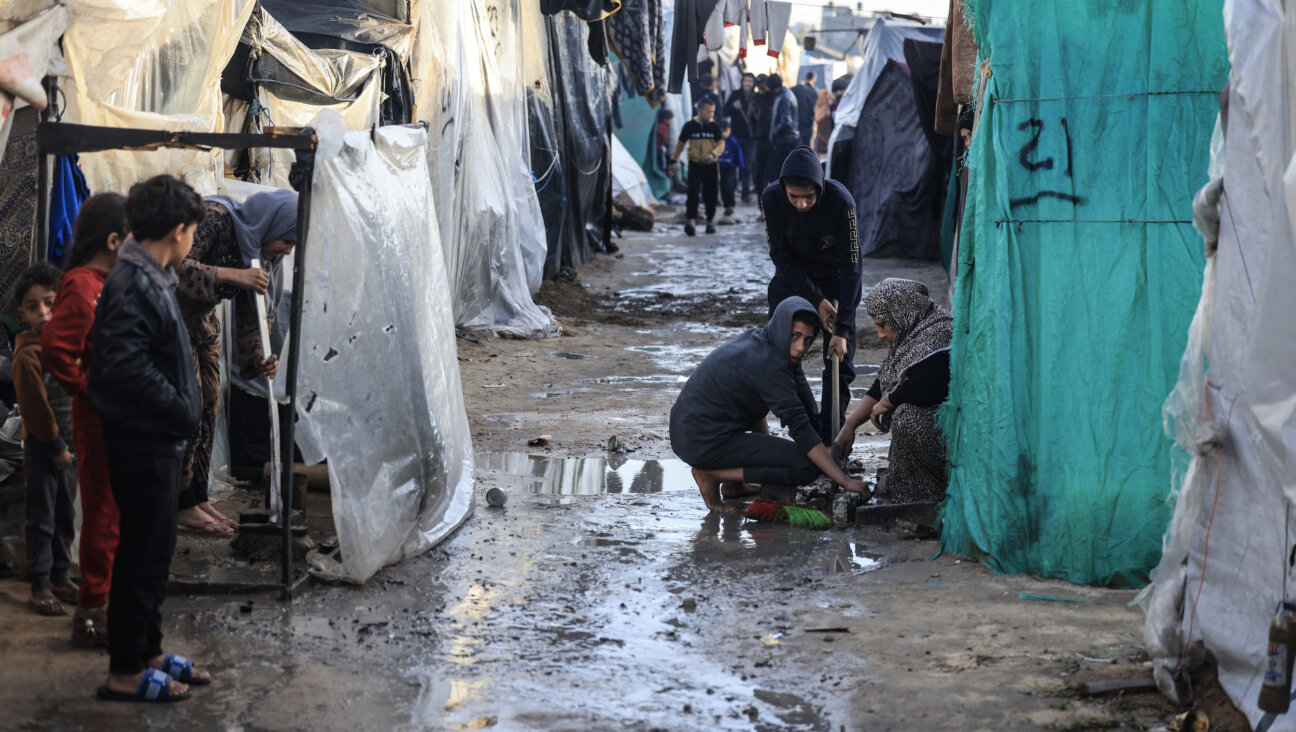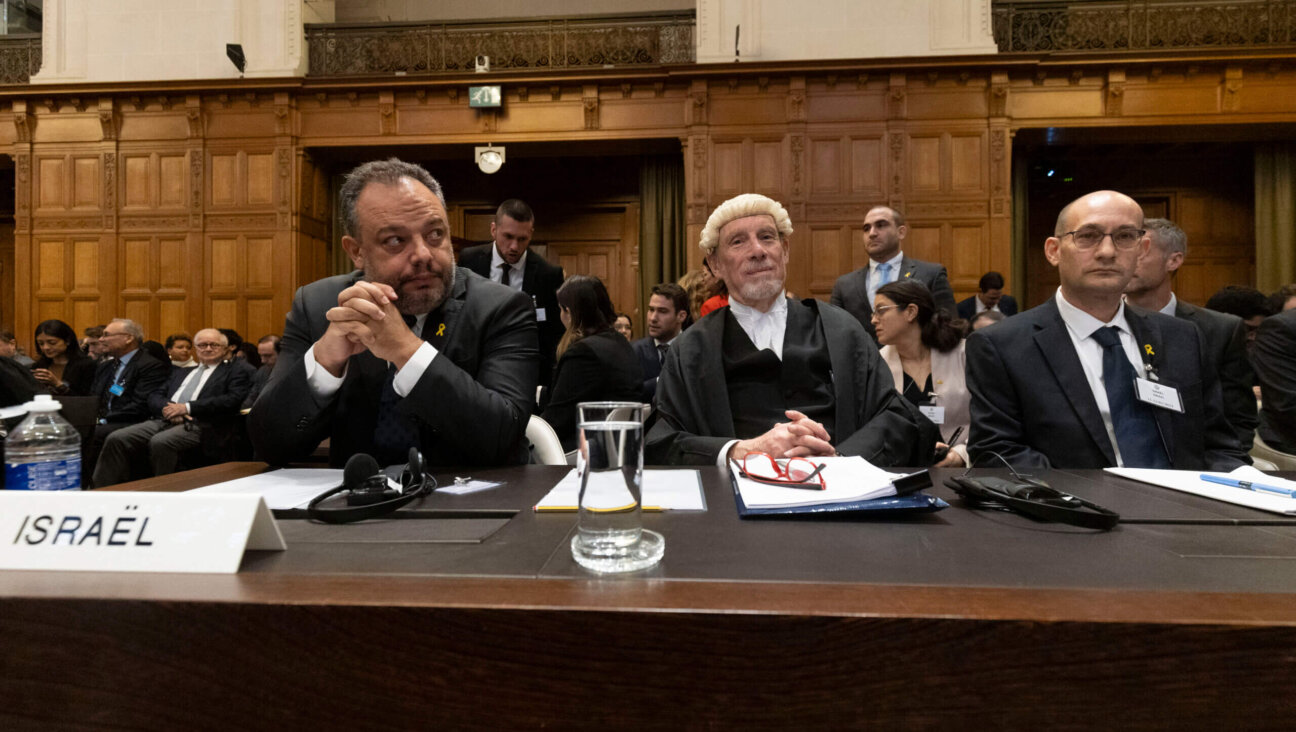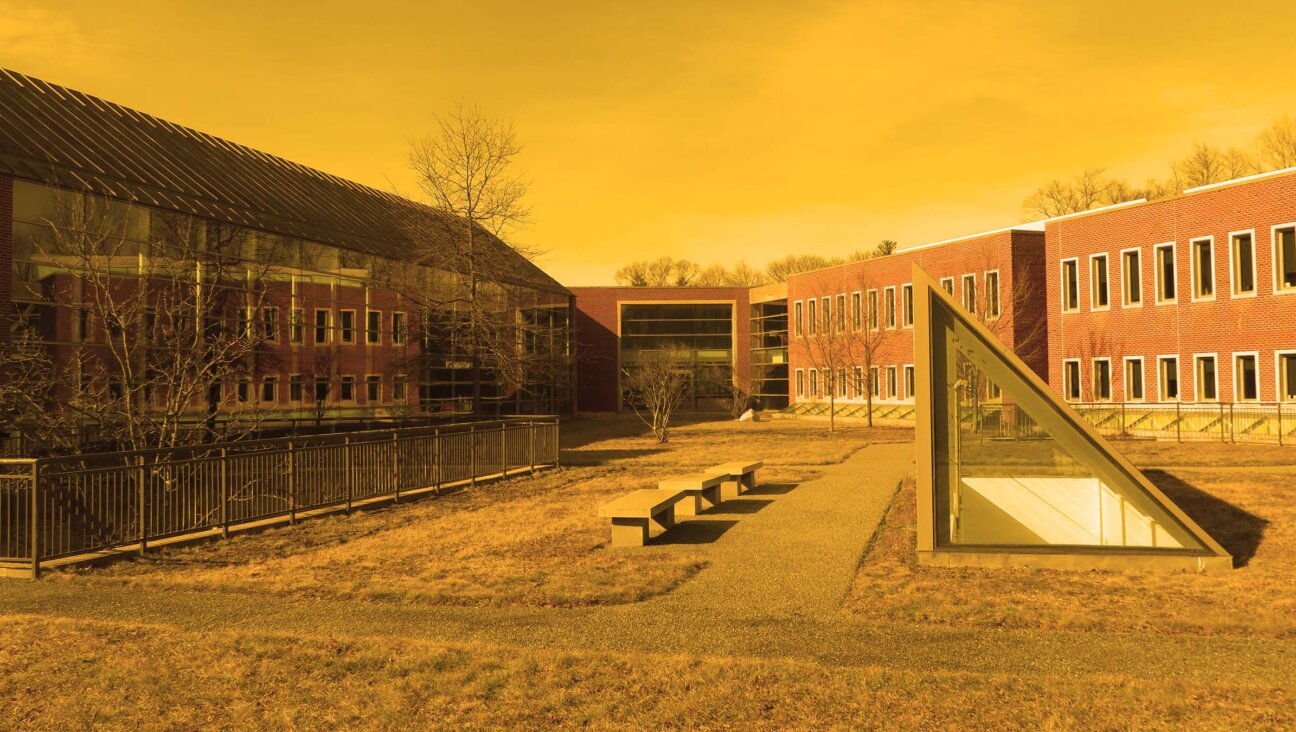‘Live without fear’: Doug Emhoff opens up about his Jewishness as he visits his ancestors’ Polish hometown
In an interview, second gentleman regrets not speaking up when witnessing antisemitism in his own past
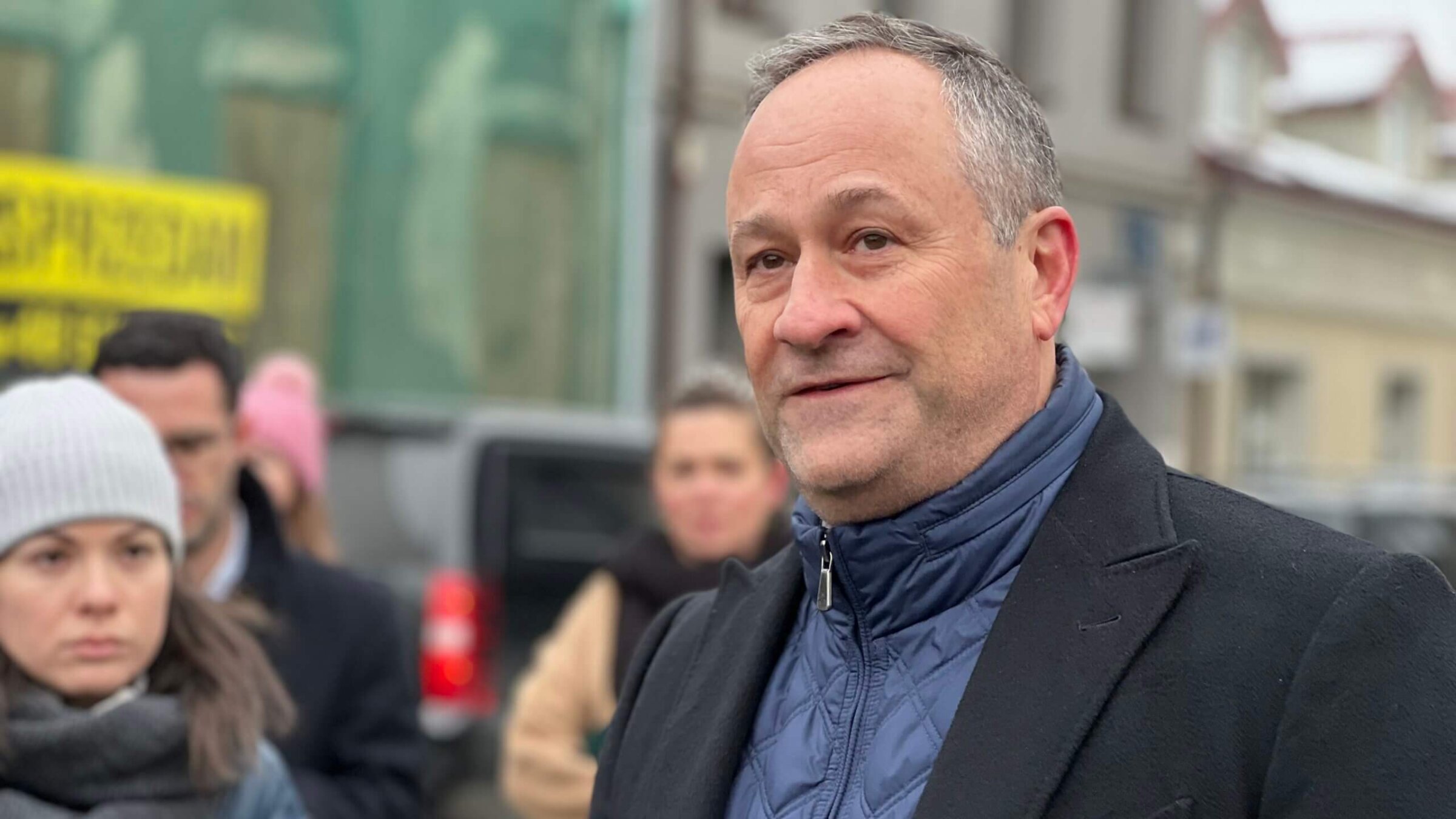
Second gentleman Doug Emhoff, speaking during a visit to Kazimierz, Poland. Photo by Laura E. Adkins
GORLICE, Poland — It’s impossible to truly process what it means to visit a site of mass murder — especially when you’re traveling with a White House entourage. On his first visit to Poland, the country from which his family fled antisemitism more than a century ago, second gentleman Doug Emhoff was flanked by members of the Secret Service and Polish security and trailed by a handful of traveling journalists and up to 50 local ones.
I had not met Emhoff before joining this six-day trip to Poland and Germany, but what you’ve heard is true: The man is thoughtful, deliberate, unpretentious and a proud Jew.
Yet it is one thing to be personable while on the campaign trail, and quite another to do so while processing the horrors of the Holocaust.
“It’s quite overwhelming,” Emhoff told me Sunday morning as we tried to warm ourselves at Cheder, a bustling coffee shop and cultural center in Krakow’s historic Jewish quarter, Kazimierz, before returning to the bone-chilling Polish winter. Ancient and modern Jewish books in Polish, Hebrew and English lined the shelves, and Moroccan-style kneeling cushions adorned the hardwood floors.
“It’s all part of the story of unraveling,” Emhoff added, “about what happened in my own family’s past.”
It’s easy, two years into the Biden-Harris administration, to forget that Emhoff first made a name for himself as an entertainment lawyer, not as a politician’s spouse and accidental spokesman for liberal and Jewish issues. Emhoff told me that his wife Vice President Kamala Harris and President Joe Biden — who has often said it was the deadly 2017 Unite the Right rally in Charlottesville, where marchers chanted “Jews will not replace us,” that sealed his decision to run — had both encouraged him to to make antisemitism a key part of his work.
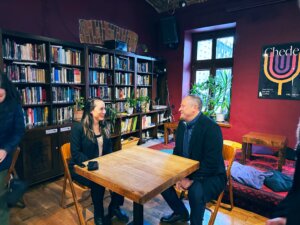
When I asked if he’d spent much time thinking deeply about the issue before he became the White House’s leader on it, Emhoff said: “I think all Jews think about antisemitism.” But for “people in my age,” he added, “it wasn’t as in your face as it is now.”
There was that one incident, though, as there is for many of us. As a young lawyer, Emhoff said, he was out with people who didn’t realize he was Jewish, and a few of them “made some pretty vile, antisemitic jokes.”
“You could cut the tension,” he told me. “And I didn’t say anything. I’ve regretted that for many years.
“There have been times when I didn’t say anything and I wish I had,” he continued. “So now, I’m gonna keep speaking out as much as I can.”
It’s hard to imagine now, watching Emhoff forcefully and personally call out antisemitism past and present in clear and concise language.
“My great-grandparents fled persecution in Poland 120 years ago. I am here because they were able to leave. Yet, so many others were not,” he said at an antisemitism roundtable Saturday at the Galicia Jewish Museum.
“Given the rise in antisemitism, it is important for me — and for all of us — to put a spotlight on the history of Jews in Europe,” he said. “We know that in some cases knowledge about the Holocaust among young people is vague or nonexistent. We must find new ways to remember and educate the next generation about the horrors of the Holocaust. To tell the testimonies of survivors. To remember the stories of those that perished. And work to ensure ‘never again.'”
Jewish life, past and present
For many American Jews, Poland is all about the past. It was, of course, a thriving center of Jewish life for centuries. On the eve of the Nazi occupation in 1939, 3.3 million Jews lived here, nearly 10% of the country’s population, and perhaps a quarter of Krakow’s.
By the end of the war, according to Yad Vashem, only 380,000 of them remained alive. Some 31,000 Jews lived in Poland in 1960, according to the North American Jewish Data Bank, and it dropped to 3,200 in 2010, though there has been a revival of Jewish life here in the years since.
The Polish government’s record on reckoning with the Holocaust is troubling, especially under its current right-wing leadership, which enacted a law in 2021 restricting restitution claims by Jews and others who had property stolen by the Nazis.
I was bothered to see, at the Auschwitz concentration camp and the factory where Oskar Schindler saved 1,200 Jews from extermination, the emphasis placed on the non-Jews who suffered during the war.
After Shabbat services at the Chabad of Krakow on Friday night, I asked people what it’s like to live as a Jew here now. One Orthodox woman, who is 27 and has two kids, told me she does not experience much antisemitism day to day, but that there is a broad sense that the Poles were only victims of the Nazis, not also their accomplices.
I found Krakow’s small Jewish community — estimates range from 200 to 1,000 or so, but that was before the flood of refugees from Ukraine — to be a shining example of living Jewish values.
On a bustling block near the old Jewish quarter of Kazimierz, the Krakow JCC is impossible to miss: Rainbow umbrellas, reminiscent of umbrella street in Jerusalem, hang above the courtyard. A bright sign in Ukrainian greets the nearly 500 refugees who come to the community food pantry and clothing bank each day.
It is this work in particular that makes me most hopeful for the Jewish future — not just in Poland, but globally.
Jonathan Ornstein, director of the Krakow JCC since 2008, told me that the Holocaust survivors who belong to the JCC had asked that their dues be devoted to helping Ukrainian refugees.
While visiting the Remah synagogue, a small ornate shul built in the 1600s, Emhoff spoke with a survivor who spent three years hiding in the Polish forests as a young boy. He told Emhoff that “the trauma of these young children fleeing violence in their homeland” reminded him of his own past.
“I have to say, meeting the Ukrainian refugees hit me pretty hard,” Emhoff told me later, at the coffee shop. People “literally opening their homes, their wallets, their clothes off their back, for people fleeing violence,” he added. “I think it’s a great lesson to bring back home.”
We only had time for a quick conversation — I was initially allotted a scant five minutes, but managed to stretch it to 10. After a walking tour of Kazimierz, we headed to Gorlice, a town of about 30,000 people two hours southeast of Krakow, where Emhoff’s family is from.
This was the most emotional part of the trip so far. He got to see the house where his family likely lived, and people inside waved to him. He met with the mayor and other community leaders, and visited the Garbacz Memorial to the Jews who perished in the Holocaust — likely including some of his own relatives.
The White House said Emhoff learned of his roots in Gorlice only last year, while viewing records at Ellis Island. His great-grandmother and great-grandfather both likely lived here, and records indicate his great-grandmother had several siblings, and that some members of her family did not survive.
Asked how he would describe the visit to his parents, Emhoff said, “probably a lot of tears.” But he said the pilgrimage was “definitely positive,” adding: “Everyone wants to know where they come from.”
Earlier, in the coffee shop, he had told me: “I love being Jewish.”
“I think we need to express that pride and talk about who we are and show who we are,” he said. “And get people to understand that and don’t be, don’t shy away, because I think some people do.”
“You can’t live with fear,” he continued. “No matter how much you think things might be bad, you have to live without fear. And that’s one of the things I keep saying, live openly, proudly, without fear.”
Follow Laura on Twitter for real-time updates, photos and videos from the second gentleman’s trip.








